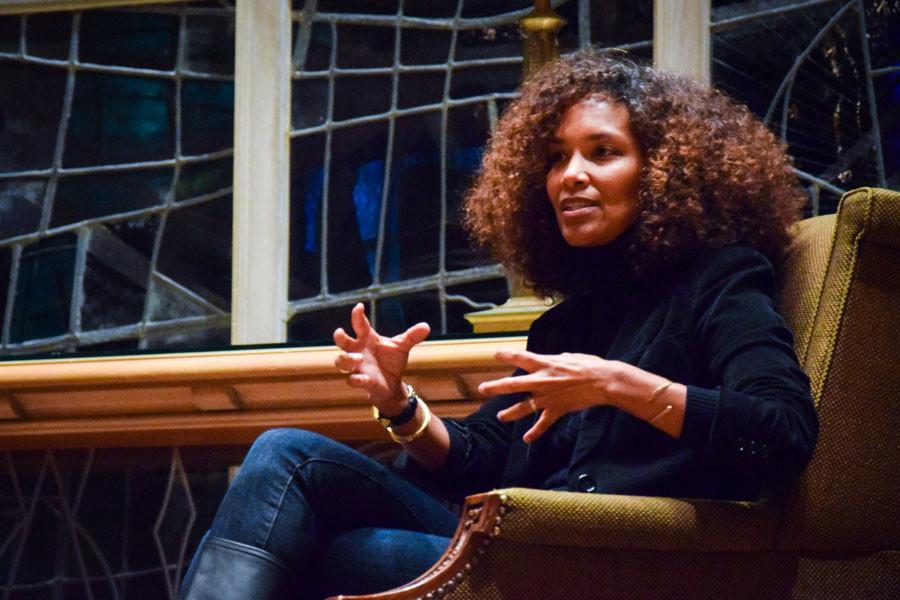Journalist, writer emphasize importance of black voices in media
Courtney Morrison/The Daily Northwestern
Mara Brock Akil (Medill ’92) speaks about her experiences as a writer and producer of TV shows during the State of the Black Union on Wednesday night. For Members Only and NU’s chapter of the National Association of Black Journalists invited Brock Akil and journalist Amy DuBois Barnett to discuss the importance of black narratives in the media.
November 19, 2015
Writer Mara Brock Akil (Medill ’92) and journalist Amy DuBois Barnett discussed the importance of black narratives in the media during this year’s State of the Black Union, hosted by For Members Only and NU’s chapter of the National Association of Black Journalists at Alice Millar Chapel on Wednesday night.
DuBois Barnett spoke about her early experiences as a female black journalist. During her first job at a magazine, she said that her boss, an Italian man, told her “black girls don’t sell” when she proposed having model Veronica Webb on the cover of their publication.
“That was my first slap in the face realization that we … were actively being regarded as not relevant enough,” she said.
When she moved to Harper’s Bazaar later on in her career, DuBois Barnett said she dealt with similar situations where she felt black voices were ignored or kept out of the narrative. She emphasized the media usually portrays black women in ways that reinforce negative stereotypes.
She said it wasn’t until she started working for Ebony magazine that she felt she was writing for a publication that accurately represents black people.
DuBois Barnett encouraged the audience to start blogs and share their stories that way.
“Everybody can have a voice,” she said. “You can use the device you have in your pocket to control the whole message.”
Brock Akil spoke about her experiences as a writer and producer of TV shows like “Girlfriends” and “Being Mary Jane,” saying she created these shows knowing her audience would be predominantly black women, but that she knew if she “did the job well,” other people would enjoy them, too.
She said “Girlfriends” dealt with black women’s sexuality a lot because it was a theme she didn’t think was properly represented in the media at the time, referencing music videos oversexualizing black women. She said she was trying to “free the humanity” of black women.
“Yet the first voice I heard … was from black women who told me that they hated that aspect of the show,” Brock Akil said. “They questioned why I had … to air our dirty laundry?”
Brock Akil said she was surprised by this response, since she expected black women to be on her side as she tried to represent them as more than just one thing. Many asked her why she couldn’t have her characters just be stable, one-dimensional “positive images,” like a lawyer, instead of having them deal with broader issues like sexuality.
“Positive images are just as damaging as negative images,” Brock Akil said. “We can’t just be lawyers because there’s so much more than that. We are mothers, we are daughters … we are so much more than lawyers.”
NU’s chapter of the NABJ held a Q&A session with both speakers during the second half of the event.
When asked about her college experience, Brock Akil said black students should feel entitled to their campus and feel free to explore different opportunities at NU without fear. She said this is especially important for black students who are the first in their families to go to an institution like NU and worry too much about being a successful student that they forget to follow their own dreams.
She said being a Medill student made her realize she didn’t want to be a journalist, which was OK because she gave herself the chance to explore other options, which is how she became a screenwriter.
Similarly, DuBois Barnett left a career on Wall Street to pursue writing, and though many told her that was a bad decision, she decided to go ahead with it.
“It’s up to me to fix my life and to figure out what am I doing to be happy,” she said. “It was the most terrifying yet powerful feeling I’ve ever felt in my life.”
FMO coordinator Yjaden Wood told The Daily that Brock Akil and DuBois Barnett are “power weights” in their fields, which is why he believes it was important to bring them to campus. He said black women are usually not showcased well in journalism and broadcast television.
NABJ president Sierra Boone agreed, saying black women are usually pushed aside by the media and, as a black female journalist, she identified with both speakers strongly.
“We talk a lot in NABJ about controlling our narrative, which was the theme of this year’s State of the Black Union and is also our chapter theme,” she said. “Ever since last year (we’ve) just have been talking about taking on the responsibility as black journalists to like live your experiences but also be an authority on how your story is told.”
Email: alfaro@u.northwestern.edu
Twitter: @marianaa_alfaro



